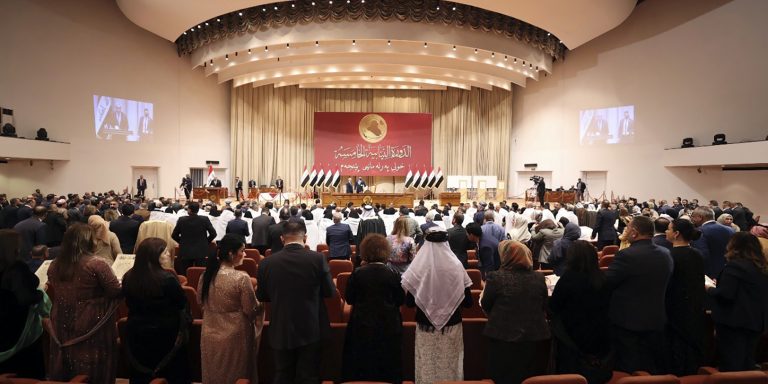INTELBRIEF
January 21, 2022
IntelBrief: Rifts Complicate Iraq’s Governance and Regional Alignments

Bottom Line Up Front
- The process of selecting the next Iraqi leaders has begun and will have a significant impact upon Iraq’s regional and global alignments.
- Disputes within Iraq’s major communities are complicating the government formation negotiations.
- Shia cleric Muqtada al-Sadr’s electoral strength gives him significant political power, but he faces challenges from more pro-Iranian Shia figures.
- Reflecting Iran’s strategic interests, Iran-backed militia commanders want to ensure that the next prime minister is more pro-Iran than the incumbent.
Regional experts had anticipated that successive Iraqi national elections would enable Iraqi politics to transcend sectarianism, localism, and factionalism exhibited between and within Iraq’s major communities—Sunni and Shia Arabs, and ethnic Kurds, most of whom are Sunni Muslim. Optimistic assessments emerged from the protest movement of late 2019, in which Shia Iraqis protested against Shia leaders, citing endemic corruption, favoritism, and the arbitrary exercise of power by Iran-backed Shia militias. However, the start of the process of forming a government on January 9, pursuant to the results of Iraq’s October 10 elections for a 329-seat National Assembly, illustrates that Iraq’s traditional divisions remain, not only between major communities but within them, as well. That day, the Assembly began selecting the first of three major posts—Assembly Speaker, President, and Prime Minister. Under an informal political bargain, the Speaker is to be a Sunni Arab, the President is to be a Kurd, and the Prime Minister is to be a Shia Arab—reflecting the political dominance of the Shia Arab majority since the fall of Saddam Hussein’s regime. The Assembly re-elected the influential Sunni Mohammed al-Halbusi as speaker, but only after the elderly politician chairing the vote fell ill during an altercation among Shia parliamentarians.
The Speaker selection began a thirty-day clock running for the Assembly to vote for a president—whose duties are largely ceremonial but include formally nominating a prime minister—amid an unexpected dispute between the two main Kurdish parties over that position. The Kurdistan Democratic Party (KDP) leadership challenged what was to be an uncontested re-nomination of the incumbent president, Barham Salih, the pro-U.S. leader of the Patriotic Union of Kurdistan (PUK). Internal dissension within the PUK, coupled with an increase in KDP-held Assembly seats, prompted KDP leaders to question the longstanding mutual agreement under which a PUK leader serves as Iraqi President and a KDP leader heads the autonomous Kurdish government in northern Iraq. Although the intra-Kurdish dispute might yet end with Salih’s re-nomination, KDP leaders might assess that holding Iraq’s presidency would give them greater influence on national decision-making, as U.S. influence in the country diminishes and Iranian pressure on Baghdad increases.
Even more unsettled is the contest to be the next Prime Minister, the position that holds executive power within Iraq’s governing structure, including command of the armed forces. Within 30 days of the selection of a president, a prime minister is required to achieve confirmation of his cabinet by the Assembly. Many experts assume that, given his faction’s increase in its Assembly representation to 73 seats (up from 54 seats), Shia cleric Muqtada al-Sadr will determine whether incumbent prime minister Mustafa al-Kadhimi retains his position. Tehran barely conceals its insistence that Kadhimi be replaced because of his affinity for maintaining U.S. military personnel in Iraq and his efforts—unsuccessful to date—to bring Iran-backed Shia militias under central command authority. The outcome of the prime ministerial selection process will undoubtedly determine the extent of Tehran’s and Washington’s respective influence on Baghdad for at least the next several years.
Sadr favors a status quo that leans toward neither Tehran nor Washington, but instead reintegrates Iraq into the Arab fold. That stance suggests that Sadr favors another term for Kadhimi, who has no formal party affiliation. However, Iran’s acolytes inside and outside the Assembly have been quick to challenge the Sadrists’ perception that Sadr will determine the next government. Pro-Iranian leaders in the “Conquest Alliance”—which consists of the political wings of several Iran-backed militias—first claimed that fraud caused the faction to win only 17 seats in the October election, down from 48 in the previous Assembly. Alliance supporters demonstrated outside Baghdad's heavily fortified Green Zone in an unsuccessful attempt to have the election results annulled. On November 7, militia elements then expressed their views violently by attacking Kadhimi’s residence with armed drones provided by their Iranian mentors. Upon the convening of the Assembly on January 9, the Conquest Alliance asserted that, by allying with the faction of pro-Iranian former prime minister Nuri al-Maliki, it constituted the “largest” party in the Assembly with 88 seats. Under Iraq’s constitution, the largest faction in the Assembly receives the first opportunity to nominate a government. Confident of his large following, Sadr responded by reiterating his intent to break with the post-Saddam tradition of a "consensus" government to instead build a “majority” government—implying that he will ally with Sunnis and Kurds, not Iran-backed parties—to choose the next prime minister.
The prime ministerial choice, whether Kadhimi stays as prime minister or someone else acceptable to the Sadrists is chosen, will illustrate how the intra-Shia rift plays out in the Assembly. But, the willingness of Sadr’s Shia opponents to use their command of armed militias forces—which are armed, trained, financed, and advised by Tehran—suggests that the political struggle will not end with the inauguration of the next government. The militias have, in recent weeks, stepped up their rocket and drone attacks on U.S. installations, including the U.S. Embassy in Baghdad. The outcome of the divisions among Shia leaders—the first major split in the overarching Shia political majority since the 2003 U.S. invasion—will likely decide whether Iraq leans toward Washington, Tehran, Riyadh, or another regional or international pole.